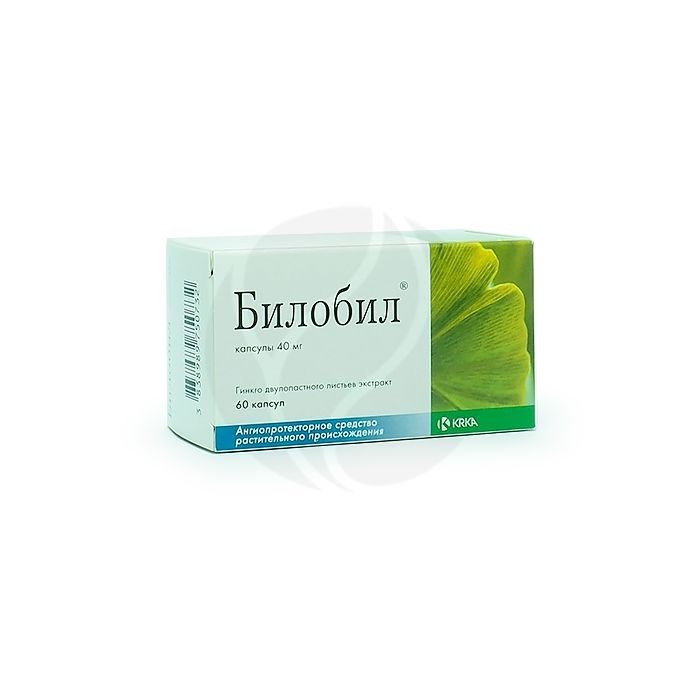Bilobil capsules 40mg, No. 60
Expiration Date: 05/2027
Russian Pharmacy name:
Билобил капсулы 40мг, №60
In geriatrics with disorders of attention and / or memory,
mental disorders,
a sense of fear,
dizziness
noise in the ears,
sleep disorders
general malaise arising from cerebrovascular disorders.
The method of application and dosage regimen of a particular drug depends on its form of release and other factors. The optimal dosage regimen is determined by the doctor. It is necessary to strictly observe the compliance of the used dosage form of a particular drug with the indications for use and the dosage regimen.
Inside, 40 mg 3 times / day.
Active ingredient: ginkgo biloba leaf extract dry * 40.00 mg
Excipients: liquid dextrose [dextrose, oligo - and polysaccharides] 2.00 mg, lactose monohydrate 66.00 mg, corn starch 30.00 mg, talc 8.00 mg , colloidal silicon dioxide 2.00 mg, magnesium stearate 2.00 mg
Composition of a hard gelatin capsule (body and lid): iron dye black oxide (E172) 0.2450%, iron dye red oxide (E172) 0.3340%, titanium dioxide (E171) 0.7417%, indigo carmine (E132) 0.0181%, dye azorubin (E122) 0.0382%, gelatin up to 100%
* Ginkgo biloba leaf extract dry from Ginkgo biloba leaf (Ginkgo biloba L., family Ginkgoaceae, folium).
The ratio of the amount of medicinal plant materials to the amount of the original extract: 35 - 67: 1.
The extractant is acetone / water.
Reduced blood clotting,
erosive gastritis,
peptic ulcer of the stomach and duodenum in the acute phase,
acute disorders of cerebral circulation,
acute myocardial infarction,
arterial hypotension,
pregnancy,
lactation,
children and adolescents up to 18 years old,
hypersensitivity to ginkgo biloba preparations.
Clinical and pharmacological group: Phytopreparation that improves cerebral and peripheral blood circulation
Pharmaco-therapeutic group: Herbal angioprotective agent
pharmachologic effect
Herbal remedy. The action is due to the nature of its influence on metabolic processes in cells, rheological properties of blood and microcirculation, as well as on vasomotor reactions of large blood vessels. Improves cerebral circulation and the supply of oxygen and glucose to the brain. Has a vasodilating effect, prevents platelet aggregation. Normalizes metabolic processes, has an antihypoxic effect on tissues. Prevents lipid peroxidation and the formation of free radicals in cell membranes. It has a pronounced anti-edema effect at the level of the brain and in peripheral tissues. In various pathological conditions, it prevents an increase in the proteolytic activity of serum.
Indications of active substances of the drug BilobilЃ
In geriatrics with disorders of attention and / or memory,
mental disorders,
a sense of fear,
dizziness
noise in the ears,
sleep disorders
general malaise arising from cerebrovascular disorders.
Dosage regimen
The method of application and dosage regimen of a particular drug depends on its form of release and other factors. The optimal dosage regimen is determined by the doctor. It is necessary to strictly observe the compliance of the used dosage form of a particular drug with the indications for use and the dosage regimen.
Inside, 40 mg 3 times / day.
Side effect
Possible: digestive disorders, headaches, allergic reactions.
Contraindications for use
Reduced blood clotting,
erosive gastritis,
peptic ulcer of the stomach and duodenum in the acute phase,
acute disorders of cerebral circulation,
acute myocardial infarction,
arterial hypotension,
pregnancy,
lactation,
children and adolescents up to 18 years old,
hypersensitivity to ginkgo biloba preparations.
Application during pregnancy and lactation
Ginkgo biloba is contraindicated for use during pregnancy and lactation (breastfeeding).
Application in children
Contraindicated in children and adolescents under 18 years of age.
special instructions
The use of ginkgo biloba preparations should be avoided in the presence of risk factors for the development of intracranial hemorrhage.
Drug interactions
There are reports that the use of ginkgo biloba preparations and the simultaneous implementation of thrombolytic therapy (taking anticoagulants, antiplatelet agents, including acetylsalicylic acid) increases the risk of cerebral hemorrhage.

